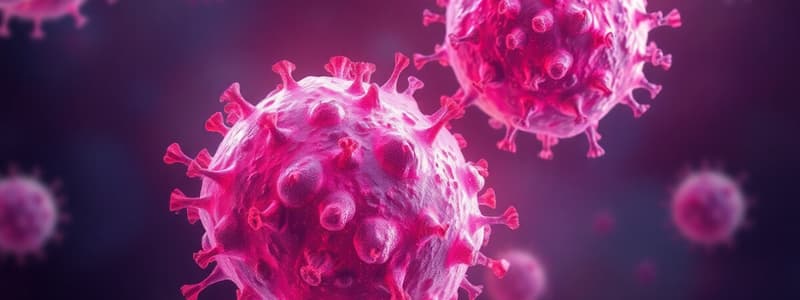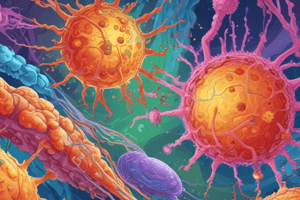Podcast
Questions and Answers
What is one of the key roles of IFN-γ in relation to TH1 cells?
What is one of the key roles of IFN-γ in relation to TH1 cells?
- Stimulates expression of MHC molecules for improved antigen presentation (correct)
- Encourages the development of TH2 cells
- Inhibits contact-mediated macrophage activation
- Promotes the production of IgE antibodies
Which of the following cytokines is primarily responsible for the stimulation of TH2 cell differentiation?
Which of the following cytokines is primarily responsible for the stimulation of TH2 cell differentiation?
- IL-5
- IFN-γ
- IL-6
- IL-4 (correct)
Which immune component is primarily activated by TH2 cells to combat helminthic infections?
Which immune component is primarily activated by TH2 cells to combat helminthic infections?
- Macrophages
- Neutrophils
- T cytotoxic cells
- Eosinophils (correct)
What is the primary function of TH17 cells in the immune response?
What is the primary function of TH17 cells in the immune response?
How do TH1 cells activate macrophages?
How do TH1 cells activate macrophages?
Which cytokine is critical for maintaining the proliferation and differentiation of TH17 cells?
Which cytokine is critical for maintaining the proliferation and differentiation of TH17 cells?
What effect does IFN-γ have on B cells?
What effect does IFN-γ have on B cells?
In which type of cells is IL-5 primarily involved?
In which type of cells is IL-5 primarily involved?
What is one of the major contributions of TH17 cells to inflammatory diseases?
What is one of the major contributions of TH17 cells to inflammatory diseases?
What therapeutic application has IFN-γ been explored for in veterinary medicine?
What therapeutic application has IFN-γ been explored for in veterinary medicine?
Which cytokines stimulate the differentiation of TH1 cells?
Which cytokines stimulate the differentiation of TH1 cells?
What is the principal function of TH1 cells in the immune response?
What is the principal function of TH1 cells in the immune response?
Which of the following is NOT a subset of CD4+ effector T cells?
Which of the following is NOT a subset of CD4+ effector T cells?
How are naive CD4+ T cells differentiated into TH1, TH2, and TH17 cells?
How are naive CD4+ T cells differentiated into TH1, TH2, and TH17 cells?
Which transcription factors are activated for the differentiation of TH1 cells?
Which transcription factors are activated for the differentiation of TH1 cells?
Which type of microbial interaction primarily induces the TH1 subset?
Which type of microbial interaction primarily induces the TH1 subset?
What role do TH1 cells have outside of activating macrophages?
What role do TH1 cells have outside of activating macrophages?
CD4+ T cell responses involve several steps. Which of the following is NOT one of those steps?
CD4+ T cell responses involve several steps. Which of the following is NOT one of those steps?
Which of the following T cell subsets is primarily involved in phagocyte-mediated host defense?
Which of the following T cell subsets is primarily involved in phagocyte-mediated host defense?
The amplification phase in the development of CD4+ T cell subsets involves which of the following?
The amplification phase in the development of CD4+ T cell subsets involves which of the following?
What is the primary role of TH1 effector T cells in the immune response?
What is the primary role of TH1 effector T cells in the immune response?
Which cytokines are crucial for the differentiation of TH1 cells?
Which cytokines are crucial for the differentiation of TH1 cells?
What is the outcome of stable commitment during T cell development?
What is the outcome of stable commitment during T cell development?
Which of the following best describes the role of IFN-γ in TH1 cell functions?
Which of the following best describes the role of IFN-γ in TH1 cell functions?
Which transcription factors are activated during the differentiation of TH1 cells?
Which transcription factors are activated during the differentiation of TH1 cells?
What triggers the initial development of TH1 effector T cells?
What triggers the initial development of TH1 effector T cells?
What are follicular helper T cells classified as?
What are follicular helper T cells classified as?
What physiological process is referred to as polarization of T cells?
What physiological process is referred to as polarization of T cells?
What is the role of cytokines produced by CD4+ T cells?
What is the role of cytokines produced by CD4+ T cells?
During the elimination of infectious pathogens, CD4+ T cells are responsible for what major step?
During the elimination of infectious pathogens, CD4+ T cells are responsible for what major step?
What is the role of IFN-γ in relation to macrophages?
What is the role of IFN-γ in relation to macrophages?
Which function is NOT associated with TH1 cells?
Which function is NOT associated with TH1 cells?
What is a major function of TH2 cells?
What is a major function of TH2 cells?
How do TH17 cells contribute to the immune response?
How do TH17 cells contribute to the immune response?
Which cytokine is primarily responsible for inhibiting TH17 cell differentiation?
Which cytokine is primarily responsible for inhibiting TH17 cell differentiation?
What is one of the key therapeutic applications of recombinant canine IFN-γ?
What is one of the key therapeutic applications of recombinant canine IFN-γ?
Which cytokines initiate TH17 cell differentiation?
Which cytokines initiate TH17 cell differentiation?
What impact does IFN-γ have on B cells?
What impact does IFN-γ have on B cells?
Which statement accurately describes the primary role of eosinophils?
Which statement accurately describes the primary role of eosinophils?
TH1 cells primarily inhibit the development of which other T cell subset?
TH1 cells primarily inhibit the development of which other T cell subset?
Flashcards are hidden until you start studying
Study Notes
CD4+ T Cells
- The primary role of CD4+ T cells is to eradicate infections by activating the immune system.
- CD4+ T Cells function by utilizing cytokine signaling to communicate with other immune cells.
- CD4+ T Cells are activated in the lymphoid organs and then differentiate into effector and memory cells.
- Effector cells migrate to infection sites to eliminate pathogens while memory cells provide a long-term immune response.
Subsets of CD4+ Effector T Cells
- CD4+ T cells differentiate into three primary subsets: TH1, TH2, and TH17, which are characterized by the specific cytokines they produce.
- TH1 Cells primarily respond to intracellular pathogens (viruses, bacteria, and parasites) that activate phagocytes and are involved in cell-mediated immunity.
- TH2 Cells are responsible for immunity against extracellular parasites, particularly worms. They are also involved in allergic reactions.
- TH17 Cells are critical for the defense against extracellular bacteria and fungi by recruiting neutrophils to infection sites.
- Follicular Helper T cells are a subset of CD4+ T Cells that are important for antibody production by B cells.
Development of TH1 Cells
- TH1 cells develop in the presence of IL-12 and IFN-γ produced by dendritic cells, macrophages, and NK cells.
- The transcription factors T-bet, STAT1, and STAT4 play a crucial role in TH1 cell differentiation.
Functions of TH1 Cells
- IFN-γ is the primary cytokine produced by TH1 cells.
- IFN-γ activates macrophages to destroy pathogens (e.g., intracellular bacteria) by phagocytosis.
- IFN-γ promotes IgG2a antibody production by B cells and inhibits IgE production.
- IFN-γ amplifies the TH1 response while inhibiting TH2 and TH17 development.
- IFN-γ stimulates the expression of MHC Class I and II molecules on antigen-presenting cells.
Therapeutic Use of IFN-γ
- Recombinant canine IFN-γ (KT-100) is used to treat allergic dermatitis.
- Human IFN-γ is in clinical trials to treat canine astrocytoma.
- Feline IFN-γ is in clinical trials for feline fibrosarcoma, often in combination with other cytokines.
TH1-Mediated Classical Macrophage Activation
- TH1 cells activate macrophages by direct contact through CD40L-CD40 interactions and by producing IFN-γ.
Development of TH2 Cells
- IL-4 is the primary cytokine that stimulates the differentiation of TH2 cells, triggered by infections with helminths (worms) or exposure to allergens.
- IL-4, IL-5, and IL-13 are the main cytokines produced by TH2 cells.
Functions of TH2 Cells
- TH2 cells stimulate IgE production by B cells.
- TH2 cells activate mast cells and eosinophils, both crucial for fighting parasitic infections.
- TH2 cells can suppress or indirectly activate macrophages via a process known as alternative macrophage activation.
Development of TH17 Cells
- IL-1 and IL-6 initiate the differentiation of TH17 cells.
- IL-23 plays a role in the proliferation and differentiation of TH17 cells, further amplifying the TH17 response.
Functions of TH17 Cells
- TH17 cells combat microbes by recruiting neutrophils to sites of infection through the production of IL-17, a cytokine that induces neutrophil-rich inflammation.
- IL-17 also stimulates the production of antimicrobial substances.
CD4+ T Cells
- CD4+ T cells play a crucial role in eradicating infections by:
- Initially activating in lymphoid organs.
- Generating effector and memory cells.
- Migrating effector cells to sites of infection.
- Eliminating infectious pathogens at these sites.
Functions of CD4+ T Cells
- CD4+ T cells mediate functions primarily through cytokines.
CD4+ Effector T Cell Subsets
- There are three major subsets of CD4+ effector T cells:
- TH1
- TH2
- TH17
- Follicular helper T Cells can also be considered a subset.
Development of TH1, TH2, and TH17 Subsets
- Each subset develops from naïve CD4+ T lymphocytes.
- The development process is known as polarization.
- The process involves:
- Induction
- Stable commitment
- Amplification
The TH1 Subset
- TH1 subset is induced by:
- Microbes ingested by phagocytes.
- Microbes that activate phagocytes.
- TH1 cells are the central population in phagocyte-mediated host defense.
Development of TH1 Cells
- TH1 cells differentiate in the presence of:
- IL-12
- IFN-γ
- These cytokines are produced by:
- Dendritic cells
- Macrophages
- NK cells
Functions of TH1 Cells
- The primary function of TH1 cells is activating macrophages to kill microbes.
- TH1 cells can also stimulate the production of IgG antibodies.
- TH1 cell effector functions are mediated via IFN-γ:
- Activates macrophages to kill microbes.
- Promotes IgG2a subclass switching in B cells and inhibits IgE switching.
- Amplifies TH1 subsets and inhibits TH2 and TH17 development.
- Stimulates expression of molecules enhancing antigen presentation (MHC I & II).
Therapeutic Uses of IFN-γ in Veterinary Medicine
- Recombinant Canine IFN-γ (KT-100) is used for treating atopic dermatitis.
- Human IFN-γ is under clinical trials for treating canine astrocytoma and used in gene therapy.
- Feline IFN-γ, along with feline IL-2 and fGM-CSF, is under clinical trials for treating fibrosarcoma, and in gene therapy.
TH1-Mediated Classical Macrophage Activation
- TH1 cells activate macrophages by:
- Contact-mediated signals delivered by CD40L-CD40 interactions.
- IFN-γ.
The TH2 Subset
- TH2 subset facilitates phagocyte-independent defense, crucial for:
- Eliminating helminthic infections
- Development of allergic diseases
- Eosinophils and mast cells are key players in this defense.
Development of TH2 Cells
- TH2 differentiation is stimulated by IL-4 in response to:
- Helminths
- Allergens
- IL-4, IL-5, and IL-13 are the primary TH2 cytokines.
Functions of TH2 Cells
- TH2 cells stimulate:
- IgE production
- Mast cell and eosinophil activity
- Alternative macrophage activation.
The TH17 Subset
- The TH17 subset is responsible for:
- Recruiting leukocytes
- Inducing inflammation
- TH17 cells help with:
- Destroying extracellular bacteria and fungi
- TH17 cells can contribute to inflammatory diseases.
Development of TH17 Cells
- TH17 cell differentiation is initiated by:
- IL-1 and IL-6
- Pro-inflammatory cytokines responding to bacteria and fungi.
- IL-23 maintains TH17 cell proliferation and differentiation.
Functions of TH17 Cells
- TH17 cells combat microbes by:
- Recruiting neutrophils to infection sites
- Producing IL-17, inducing neutrophil-rich inflammation
- IL-17 stimulates the production of antimicrobial substances.
Studying That Suits You
Use AI to generate personalized quizzes and flashcards to suit your learning preferences.



